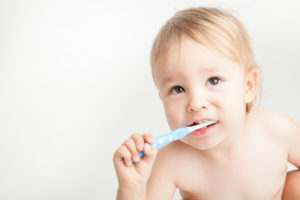
In our blog this week, we want to teach you about the importance of infant oral health care. In the past, many people believed that baby teeth were not important because adult teeth eventually replaced them. Recent research suggests that baby teeth are important contributors to the health and function of the adult dentition. The American Dental Association currently recommends that children see a dentist by the time their first tooth erupts or before they turn 1 year old, whichever event happens first. Once the first tooth erupts, it is important to maintain the health of the dentition with dental visits every 6 months. If a child has turned 1 and does not have any teeth yet, it is important for that child to visit the dentist to ensure that dental development is taking place normally.
We want to teach you all about the normal growth and development of the pediatric dentition. Here At Ponte Vedra Complete Dentistry, we are dedicated to patient education. One of the ways that we educate our patients is with our weekly blog. We want you to know how normal dental development proceeds for children so that you can be prepared for variations of normal. If you have any questions about your child’s dental health, please feel free to contact us at any time electronically or call (904)285-7711. We offer pediatric dental services for children of all ages in and around the Ponte Vedra Beach community.
Pregnancy
It is important that you first begin thinking about your child’s oral health during pregnancy. Your child’s jawbone begins to develop at 6 weeks in utero and the teeth start to form at 7 weeks in utero. The best thing that you can do for your child’s health during pregnancy is to take care of yourself. Eat nutritious foods and take prenatal vitamins as recommended by your OB-GYN. Taking care of your own dental health during this time can prevent the future development of dental problems in your child.
First Dental Examination
Your child should visit a dentist before his or her first birthday or once the first tooth comes in. The first tooth to develop is usually the lower primary central incisor, which is the first bottom tooth towards the middle. At the first appointment, your dentist will perform a “lap to lap” examination with the parent actively involved in the appointment. This will help your child become comfortable with the dentist. Your dentist will also review some important preventative care techniques with you and demonstrate proper techniques on your child.
Early Childhood Caries
Some people believe that children’s teeth do not need fillings in them because they will eventually fall out anyway. This is not true. Baby teeth need to have fillings placed when they are decayed to ensure proper development of underlying adult teeth. Before any teeth develop, you should wipe your child’s gums with a soft, wet cloth after they feed. Once the first tooth develops, the teeth should be brushed at least twice per day with a soft toothbrush. To prevent baby bottle tooth decay, never put your child to bed with a bottle. For more information on baby bottle tooth decay, please watch the following video from the American Dental Association.
Non-nutritive Sucking Habits
Non-nutritive sucking habits include pacifier use and thumb sucking, among other things. These habits are a normal part of childhood and over half of infants and toddlers engage in these habits. In order for these habits to not produce deleterious effects on the adult dentition, however, it is important to help your child quit these habits by age 36-48 months. Your dentist will give you tips and tricks to help your child stop these habits.
Trauma
The peak age for traumatic injuries to the primary teeth is between ages 2-4 years old, when children are developing mobility skills. If your child falls and “bumps” a tooth, it is important for that child to visit the dentist to ensure that the adult dentition development is not impeded. If your child loses a tooth, store it in a glass of milk and visit the dental office as soon as possible.
We hope that you learned something by reading this article today and hope that you will pass this information along to your friends and family members. It is important that all parents understand the importance of early childhood dental visits for the prevention of dental diseases and the establishment of healthy habits at a young age. If you have any unaddressed issues or would like to schedule an appointment, please contact us at any time electronically or call (904)285-7711.



